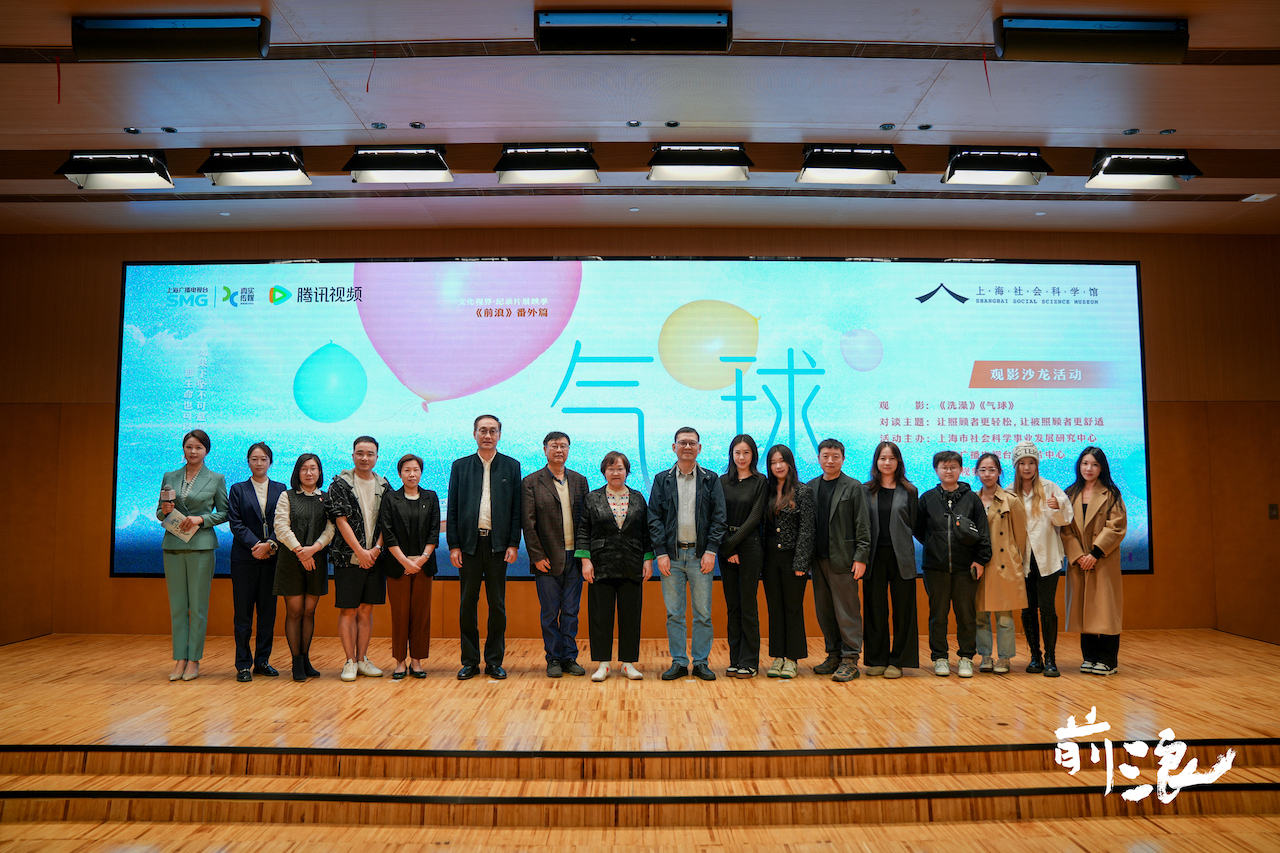
Old age is a subject each of us must confront, and caregivers and those receiving care are two identities that cannot be avoided. If caregiving is deemed a "guaranteed failed battle," how should we understand its value?
On November 9, the "Cultural Perspective: Documentary Screening Season," co-hosted by the Shanghai Academy of Social Sciences Development Research Center, Shanghai Radio and Television Documentary Center, and Tencent Video, held an event featuring the documentaries "Bathing" and "Balloon" at the Shanghai Social Science Museum. The screening showcased the "Bathing" episode and the special episode "Balloon" from the documentary "The Front Wave." Guests engaged in discussions on the topic of “making caregivers more at ease and making those they care for more comfortable,” exploring the methods and values of elderly care, with the aim of raising society's awareness and providing valuable insights for families facing caregiving challenges.

The Special Episode of "The Front Wave" Reveals the True Emotional State of Caregivers
As China's aging population continues to grow, the issue of elderly care is becoming a focal point of public concern. The documentary "The Front Wave," which records the realities of elderly life, will air in the summer of 2024, illustrating the heavy caregiving burden shouldered by caregivers of disabled elderly individuals.
The seventh episode, "Bathing," addresses the most difficult and hidden topics of caregiving, following professional bathing assistants as they delve into various households, showcasing the responsibilities of disabled elderly caregivers and the deepest, most genuine desires of the disabled elderly.

A still from the special episode "Balloon" of "The Front Wave"
On November 7, the special episode "Balloon," created by the same team behind "The Front Wave," was released, further recounting caregiving stories. Sixty-year-old Qian Weihong could not bear to leave her parents, who suffer from Alzheimer's disease, in a nursing home, so she transformed her home into a "family nursing home," taking on the role of a full-time caregiver.
Over five years of home caregiving, she witnessed her mother's gradual decline into dementia, bid farewell to her father, and endured her own battle with cancer. The balloon, initially a tool for her post-surgery rehabilitation, unexpectedly turned into a delightful interactive toy shared with her bedridden mother. Throughout the caregiving process, Qian Weihong developed a practical set of caregiving techniques, acknowledging that while aging and death are inevitable, there are still ways to make the lives of those in care a bit more comfortable and joyful.

Poster for "The Front Wave"
During his speech, Zhou Quan, deputy director of the Shanghai Radio and Television Documentary Center, remarked, "From a realistic perspective, the aging of society is a process that no one can resist; it is a perfectly normal natural phenomenon. In this process, how can we enhance the quality of life for the elderly through caregiving relationships? I believe this topic offers a richer narrative beyond elderly stories in documentaries. As a documentary team or practitioners, we hope to use storytelling and visual expression to build a consensus in society and explore how to better establish unique caregiving relationships for Chinese people."
Zhou recalled when he worked with Fan Shiguang on "Human World," spending about four to six years filming in hospitals. Almost all the doctors shared a concept with the team: that Chinese people might spend 80% of their lifetime savings during the last stages of life.
"In other words, we allocate substantial funds and resources for the final moments of life. Yet, analyzing from a life cycle perspective, might we be able to do more before the end of life, or could we shift our perceptions regarding illness and death? We should not view it merely as an endpoint but perhaps as a process we can also make more beautiful.”

Poster for "Balloon"
Qian Weihong, the main character in the special episode "Balloon," shared her experiences as an ordinary caregiver, expressing her sorrows and joys. "I believed my goal at the time was to alleviate my parents' suffering as quickly as possible. In my effort to relieve their pain, I sought better methods. Although I faced some setbacks, sadness, or distress myself, I felt immense happiness and accomplishment when solutions were found."
When asked, “What would you say to middle-aged and young people facing their aging parents?” Aunt Qian said she is eager to share her methods and skills for caring for Alzheimer’s patients, offering advice on home modifications for the elderly if parents are reluctant to move to nursing homes. For Aunt Qian, caregiving for the elderly is not solely about failure, sadness, and loss; the experience has given her a renewed understanding of the significance of aging and life and death.
Fan Shiguang, the overall director of "The Front Wave," noted that in the months following its airing, the team has continued to focus on elderly topics, with the recent release of the special episode "Balloon" once again pinpointing the societal pain points of elderly care. It emphasizes the perspective of caregivers and aims to awaken societal awareness, providing valuable insights for families coping with caregiving dilemmas.
"When we later interviewed Aunt Qian, she simply explained, 'I took good care of the elderly and managed the surrounding environment; we who stayed here felt comfortable.' This sparked a significant realization for me: how to maintain a positive outlook on life? The aging and degeneration of the elderly are irreversible processes. If we join in lamenting, complaining, and blaming, we often make life chaotic." Fan Shiguang elaborated, "We still hope to convey a positive life perspective to the public, particularly to families like Aunt Qian's who share similar experiences."

A screenshot from "Balloon"
“Family-style Nursing Homes” May Become the Future Trend in Elderly Care
The "family nursing home" concept, tailored by Qian Weihong for her parents in "Balloon," left a profound impression on viewers. Home-based care is gaining increasing attention for its unique advantages, such as familiar environments, a warm family atmosphere, personalized services, and professional care conditions. Xie Lin, a producer from Tencent Video's Eureka Studio, also pointed out that effective care relies on not just the warmth of family ties, but also on professional knowledge and support from specialized institutions.

A screenshot from "Balloon"
Sun Hongyan, deputy director of the Nursing Department at Shanghai's First Welfare Institute, believes that while institutional care is very professional and can meet the basic physiological needs of the elderly, it may lack in emotional companionship. She suggests that for elderly individuals with Alzheimer's, if family members possess certain caregiving skills and can provide adequate care at home, choosing home care may be beneficial. "However, if family care becomes overwhelming or impacts family members negatively, professional assistance must be sought. We need to be realistic about our capabilities."
Professor Hao Yong from Shanghai Normal University Tianhua College's Center for Social Security and Social Policy Studies, emphasized in a discussion that, from the perspective of traditional Chinese virtues, the value of respecting the elderly and caring for the young encourages society to advocate for home-based elderly care. Analyzing the habits of Chinese elderly individuals reveals a preference for aging gracefully at home. Given the current social supply of elderly care services, the ongoing development requires more emphasis on the supporting role of home care for families. Thus, both planning and policy encourage home-based elderly care.
Hao Yong mentioned the need to shift perceptions on caregiving, stating, “In the short documentary, Aunt Qian's mother strongly inflated the balloon using her hands. Fully utilizing these two hands could greatly improve Aunt Qian's mother's future quality of life. Caregiving should leverage the capabilities of the cared-for; our definition of caregiving should extend beyond just the caregiver's role to that of a facilitator.”

A screenshot from "Balloon"
Ge Jian, deputy director of the Elderly Services Division of Shanghai's Civil Affairs Bureau, pointed out that according to national guidelines, an increasing number of elderly care policies are becoming accessible to all elderly citizens. However, in practice, many elderly individuals experience a sense of “refusing to grow old.” He believes current policies should pay greater attention to family caregiving. “I think whether it is elderly individuals or their children, everyone should adopt the mindset that we will inevitably age and that there will be a stage when care is required. Every elderly person and their children should embrace this idea—how should we prepare in advance? This is the first aspect. Secondly, we still face significant bottlenecks in the supply of professional caregivers. Our goal is not solely to cater to the nursing staff of nursing homes; we envision a future where every family can possess certain caregiving knowledge.”


